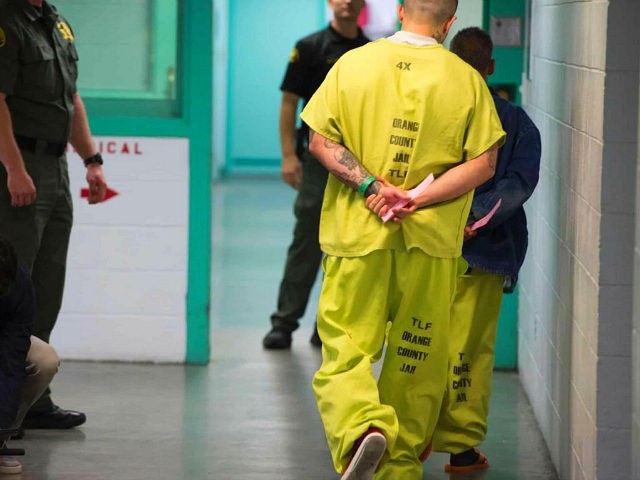San Bernardino, California, Sheriff John McMahon has spoken out about how state law prevents him from cooperating with the federal government to enforce immigration law, which results in the release of “dangerous criminals” back onto the streets.
“To be quite honest, those that are wanted by [Immigration and Customs Enforcement] ICE, that are detained in our facilities, are dangerous criminals,” McMahon said in the interview posted to the department’s YouTube page in February and reported last week by the Redlands Daily Facts.
“If we allow that inmate to walk out of our jail, and ICE isn’t there to pick him up, that inmate returns to the community,” McMahon said. “That could pose a danger for the public that we serve and try to protect.”
Last year, California passed SB 2792, or the TRUTH Act, which puts in place, in part, the following:
The TRUTH Act … requires that if Immigration and Customs Enforcement (ICE) places a detainer (any of various requests by ICE to transfer custody or receive notice of release) on someone in a California jail, the jailor, called the “custodial law enforcement agency,” also must provide the person with a copy of the detainer.
In addition, if a jailor does notify ICE of an inmate’s release date, they must provide the same notification in writing to the immigrant and their attorney or designee.
Significantly, the TRUTH Act provides detainees with procedural rights in ICE interviews. It requires law enforcement agencies to give inmates whom ICE wants to interview “a written consent form that explains the purpose of the interview, that the interview is voluntary, and that he or she may decline to be interviewed or may choose to be interviewed only with his or her attorney present.”
The Redlands Daily Facts reported on the fact that, although San Bernardino has not put a “sanctuary city” policy in place, the clash between federal and state laws could be an issue. Attorney General Jeff Session announced that state and local law enforcement jurisdictions that do not enforce immigration law — or impede its enforcement — will not be eligible for lucrative federal policing grants or other federal assistance.
In the case of San Bernardino, compliance or non-compliance will determine whether the city can take part in the Public Safety Partnership program, part of the Violence Reduction Network, which helps with the investigation, prosecution, and deterrence of violent crime, most notably crimes related to gangs and drug trafficking, according to its website.
San Bernardino does get federal funding to help law enforcement, including a grant that funds 11 police officer positions and $546,000 that it shares with Fontana, California, for a police body camera program, according to the Redlands Daily.
The DOJ picked 12 cities for public safety programs and, in addition to San Bernardino, requested additional information from three other cities — Albuquerque, New Mexico; Baltimore, Maryland; and Stockton, California.
“Sessions sent letters to police chiefs in four cities … asking them to confirm their cooperation with immigration officials, and there’s one sticking point.” the Redlands Daily reported. “The letter asks if correctional and detention facilities will honor a written request from the Department of Homeland Security to hold a foreign national for up to 48 hours beyond the scheduled release date, in order for Homeland Security to take custody of the immigrant.”
“That’s up to the San Bernardino County Sheriff’s Department, not the city, but the answer is no — not unless they receive legal authority to do that,” the Redlands Daily Facts reported.
A spokesman for the sheriff said that cooperating with the feds would be “unconstitutional.”
“There’s not going to be any change in our policy,” Lt. Sarkis Ohannessian, spokesman for the sheriff, said. “That is unconstitutional. We cannot do it — we are going to get sued.
“It’s a hurdle that is not going to get fixed unless (the Justice Department) comes up with some kind of a warrant program where a judge comes out with a warrant, and then we’ll be more than happy to keep them longer,” Ohannessian said.
The California legislation is still considering Senate Bill 54, the so-called “sanctuary state” bill, which would prohibit state and local law enforcement agencies from using resources to help with federal immigration enforcement, including not allowing federal immigration authorities access to interviews with illegal aliens who are jail.
In March, Sessions announced the policy directed at states and cities that have adopted policies “designed to frustrate the enforcement of our immigration laws.”
“This includes refusing to detain known felons under federal detainer requests, or otherwise failing to comply with these laws,” Sessions said. “For example, the Department of Homeland Security recently issued a report showing that in a single week, there were more than 200 instances of jurisdictions refusing to honor Immigration and Customs Enforcement (ICE) detainer requests with respect to individuals charged or convicted of a serious crime.”
“The charges and convictions against these aliens include drug trafficking, hit and run, rape, sex offenses against a child and even murder,” Sessions said.

COMMENTS
Please let us know if you're having issues with commenting.